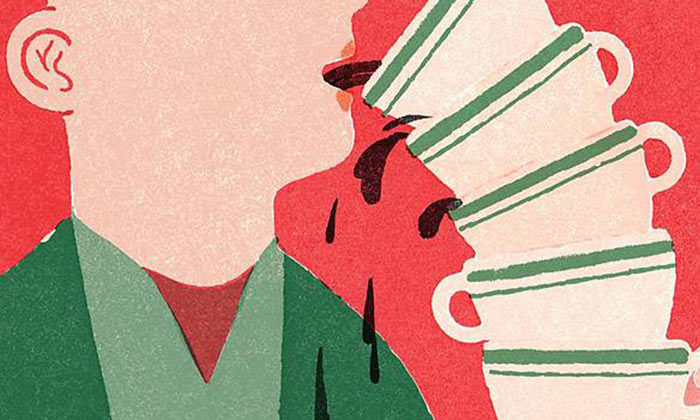
When caffeine is consumed in moderate amounts, it has positive effects in most people. But as you increase the consumption, it results in producing cortisol which can cause numerous health problems.
There are people who down many cups of strong coffee everyday thinking caffeine does not affect them, primarily their sleep. Let’s quote an example of a man who underwent a successful open-heart surgery to beat heart blockages. He is a prominent coffee drinker. On observing him closely, one could see how easily he became upset with small irritations over the course of the day. This prompts us into looking the effects of caffeine and if could cause heart complications.
By far, caffeine is the leading non-prescription drug in America which is consumed by more than 90 million adults in tea, coffee, soft drinks, energy drinks and as prescription and OTC medicines. 8-ounce cup of coffee that is brewed contains 95-160 milligrams of caffeine. Instant coffee gives 63 milligrams of caffeine. 1 ounce of espresso delivers 47-64 milligrams, 25-29 milligrams in brewed green tea, 8 ounces of black tea gives 25-48 milligrams, 24-46 milligrams in 8 ounces of cola and, 12-ounce energy drink contains up to 300 milligrams. Caffeine is also present in chocolates candies, foods like waffles, decaffeinated coffee, etc.
We are not misjudging coffee, and neither are we against the consumption of coffee. A lot of people drink 2-3 cups of coffee a day which you can water down with a lot of milk. It stimulates the Central Nervous System, boosts alertness, decreases fatigue and exhaustion, and improves concentration and focus. It enhances endurance and stamina in sports people. It boosts the process of weight loss by curbing the appetite and producing heat and energy while the food gets digested. When consumed in moderate amounts, coffee also reduces the risk of many types of cancer.

If caffeine was not there, there would be many accidents considering a lot of drivers fall asleep while driving. People keep coffee available while driving long distances, and also have a cup before going to a play, opera or concert. But this must not be overdone as the body may become resistant to the stimulating effect and coffee may not be helpful any longer in keeping you awake.
The U.S. FDA recommends intake of maximum 400 milligrams which is the amount approximately in two to three cups depending on the roast and brand. But what if you consume it in excess, something like 6 cups of coffee in a day? Although there may be no disruption in your sleep, yet it may affect heart rate, blood pressure, anxiety, irritation and jitteriness which can have an unwelcome effect on the cardiovascular functioning.
Caffeine increases the production of stress hormone, cortisol which is responsible for the flight or fight response in a situation of crisis and threat. Cortisol is produced by the adrenal glands when stimulated by pituitary gland and hypothalamus. It diverts the functions of the body for a fast response to danger or stress.
A sudden jolt due to cortisol raises the blood pressure, increases the heart rate and energy levels which help outrun the clutches of a hungry lion. We don’t need to worry about falling prey to a wild animal. But a lot many of us live in a state of constant biochemical stress with the alarm system of the body turned high all over the day.
Too much cortisol can result in health conditions like depression, anxiety, memory and concentration problems, weight gain, inability to sleep and heart diseases.

In people who consume coffee every day, the cortisol responses get reduced and they are not totally eliminated. As per a report published in “Psychosomatic Medicine” [1], a team led by William R. Lovallo, stress expert at University of Oklahoma, elevations in cortisol secretion may have long term health consequences. The harmful effects include impaired response by the central nervous system and immune system, memory problems, difficulty in things like making judgments, problem solving, attention, motivation, memory, learning, empathy and emotions.
The most serious adverse effect of too much caffeine consumption is that it increases blood pressure. As per Lovallo daily intake of caffeine does not expunge the response of blood pressure to caffeine in healthy individuals. Other studies have revealed that those at risk of hypertension have exaggerated cortisol responses to caffeine. Lovallo has reported that those with positive family history have prolonged responses to cortisol than low risk individuals.
For hypertensives, not only is a low sodium diet recommended but also, they must reduce the intake of caffeine. A possible way out is replacing caffeine with decaf. There is another reason to reduce the amount of cortisol in the blood. A study [2] examining 466 men and women with average age 62 having no signs of coronary artery disease, found that in around 40% of the people who reacted to a stressful event with a rise in cortisol, calcium deposits increased which is related to more arterial plaque and more chances of heart attack.
Moreover it was found in healthy young women that a rise in blood pressure due to stress [3] is related to increase in the chances of deposition of calcium in the coronary arteries after 13 years.

So, like most other things, moderation is the key and it helps maximize the benefits and minimize the risks.






